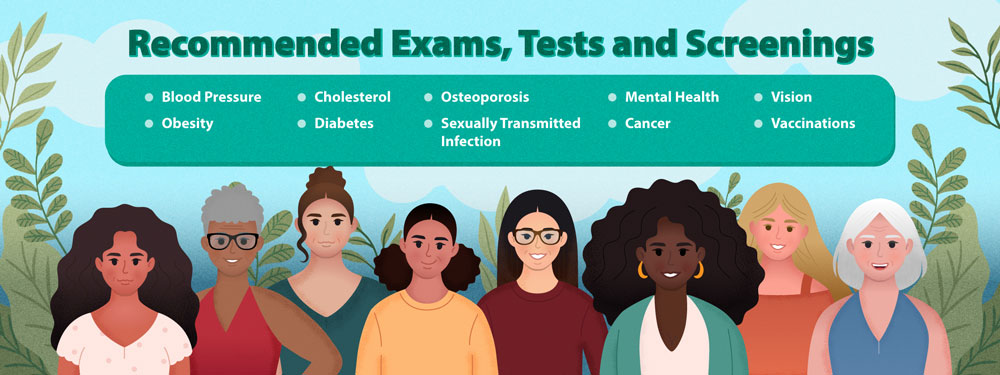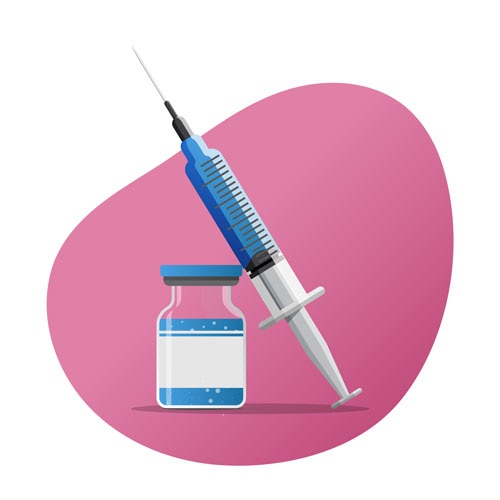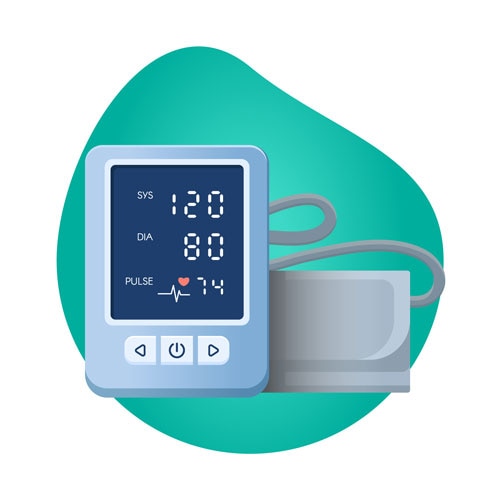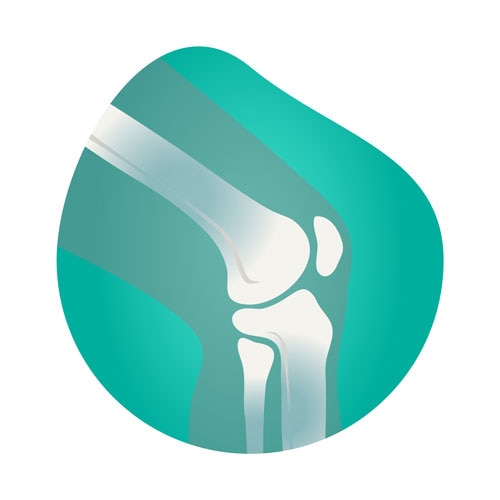
Knowledge is power. This detailed section will empower you with essential information about each screening, test or exam by clarifying its purpose and recommended frequency.
Blood pressure screening
High blood pressure, or hypertension, is a silent condition (meaning it often has no symptoms) that significantly increases your likelihood of heart disease and stroke. A blood pressure screening is a painless test that uses a blood pressure cuff to measure the force or pressure of blood against artery walls. The American Heart Association recommends that all adults undergo this screening at least yearly if their blood pressure is within the normal range, with more frequent testing if it's elevated.3
Obesity screening: Body mass index (BMI)
The body mass index (BMI) is a key indicator of healthy body weight and potential health issues related to obesity. Calculated from a person's height and weight, BMI helps assess the overall fat in the body. The American Heart Association suggests that all adults have their BMI calculated during regular health checkups to monitor their weight status and associated health problems.3
Cholesterol screening
Cholesterol screening is essential for understanding your chances of having heart disease. The American Heart Association recommends this test, which measures cholesterol, triglycerides and other lipids (fat particles) in the blood, for all adults age 20 and older. You'll need to repeat this blood sample analysis every four to six years if you have no contributing factors.3
Diabetes screening
Diabetes screening is vital for early detection and management of diabetes and prediabetes. It typically involves blood tests like fasting plasma glucose or A1C, which indicate blood sugar levels. The American Diabetes Association recommends starting screening at age 35 — or younger if you have contributing factors like obesity, family history or a history of gestational diabetes (diabetes during pregnancy) — with a frequency of at least every three years.4
Osteoporosis screening: Bone density scan
A bone mineral density test, like dual-energy X-ray absorptiometry (DEXA), is a medical imaging test that measures bone density to assess the likelihood of getting osteoporosis and fractures. This test is for women over 65, or women who are younger and have contributing factors. The U.S. Preventive Services Task Force does not yet have a recommendation for how often premenopausal women and women with contributing risk factors should be screened.5
Sexually transmitted infection (STI) screening
STI screening (also called STD counseling) is an easy way for your health provider to know whether you should discuss testing. Tests may help detect and treat infections like HIV, syphilis, chlamydia and gonorrhea. Who knew a simple blood test, urine sample or swab could bring so much peace of mind? The CDC recommends that sexually active individuals, especially those with new or multiple partners, be tested at least once a year.6
Mental health screenings (anxiety and depression)
Three-quarters of lifetime mental health conditions begin by age 24.7 And many times, the symptoms are subtle. Mental health screenings for conditions like depression and anxiety involve questionnaires, interviews and discussions with health care providers. The National Alliance on Mental Illness stresses that these screenings are for anyone experiencing symptoms or with contributing factors, suggesting regular health checkups or as needed.7 Mental health screenings are also important before, during and after pregnancy.
Skin cancer screening
Skin cancer screening, which includes a full-body examination by a dermatologist, is vital for early skin cancer detection. The Skin Cancer Foundation advises individuals to undergo this screening annually, or more often if you have a higher likelihood of skin cancer.8
Colorectal cancer screening
Colorectal cancer screenings may include colonoscopies and stool tests, which help detect colon and rectal cancers. Stool tests are non-invasive screening methods for colorectal cancer that analyze stool samples for specific DNA mutations and blood for cancer or precancerous polyps in the colon or rectum. A colonoscopy is a more invasive procedure where a doctor uses a long, flexible tube equipped with a camera (colonoscope) to visually examine the entire colon and rectum for abnormal growths. It also allows for the removal of polyps and tissue sampling if necessary. The American Cancer Society recommends colorectal cancer screenings for adults aged 45 and older, which may include a colonoscopy every 10 years.9
Breast cancer screening
A traditional mammogram is a special type of X-ray imaging technique used to detect breast cancer. Newer technology offers enhanced clarity and the ability to digitally manipulate images for better visibility. A 3D mammogram, or digital tomosynthesis, creates clearer images, which is particularly useful for women with dense breast tissue. Better pictures potentially reduce the need for follow-up imaging.
The American Cancer Society recommends that women start annual mammography screening for breast cancer at age 45, and potentially transition to screening every two years at age 55. For women between the ages of 40 and 44, mammography is an option based on personal choice and discussion with your healthcare provider.10
Cervical cancer screening (Pap test and HPV screening)
Cervical cancer screening, including Pap tests and human papillomavirus (HPV) screening, helps detect cervical cancer and its precursors. The American Cancer Society says cervical cancer screening is for women ages 25 to 65, with a frequency of every three years for a Pap test, every five years for an HPV test or as recommended by your provider.11
Vision screening
Regular eye examinations that test for vision loss or eye diseases become increasingly important with age. Vision experts recommend that women get a comprehensive eye exam every five to 10 years if they are younger than 40, and every two to four years if they are between the ages of 40 and 54.12 These exams can help detect early signs of eye diseases or conditions such as cataracts, glaucoma and macular degeneration.
Dental and oral cancer screening
Women have unique oral health concerns. Fluctuating hormone levels during menstruation, pregnancy and menopause can cause problems with your oral health. Diabetes can also hurt your oral health.
Brushing, flossing and visiting the dentist regularly can help prevent disease in your mouth and the rest of your body. Dental checkups are key for maintaining oral health and can also provide indicators of overall health. Adults should undergo regular dental examinations to monitor their dental health and identify any underlying problems.
Vaccinations
Vaccines don’t just protect you from childhood illness; certain shots protect you throughout adulthood. The annual flu vaccine is for all adults, as influenza is particularly harmful, even fatal, in older adults or those with certain health conditions. The Tdap vaccine, also called a tetanus shot, is every 10 years, with a specific recommendation for pregnant women to protect newborns from pertussis. Adults aged 50 and over should receive the shingles vaccine, while those 65 and older should get the pneumococcal vaccine to help prevent pneumonia. Additionally, the HPV vaccine is for adults up to age 26 who didn't receive it in adolescence, offering protection against HPV-related cancers.13
Finally, for individuals with specific health conditions, travel plans or occupational hazards, your healthcare provider may recommend additional vaccines like hepatitis A and B, meningococcal and others. These vaccination schedules are specific to different age groups and health statuses, underscoring preventive health needs throughout adulthood.13
Assembling Your Healthcare Dream Team

It’s a good idea to find healthcare providers you trust and visit the same doctors to ensure continuity of care. A consistent healthcare team can better track your health history, recognize changes over time and even provide tailored advice and treatment. Additionally, having a dedicated team of healthcare providers leads to more comprehensive and coordinated care that addresses all aspects of a woman's health needs.
Here's a breakdown of some of the types of providers you may want to include in your care:
- Primary care provider (PCP): Your PCP is your first point of contact for general health concerns and preventive screenings. They can also refer you to specialists when needed. Not all PCPs are doctors; some are physician assistants (PAs) or nurse practitioners (NPs).
- Gynecologist: OB-GYNs specialize in both obstetrics (pregnancy and childbirth) and gynecology. They focus on women's health, providing services like Pap tests, birth control consultations and management of gynecological conditions.
- Dentist: These are doctors who are trained to care for your teeth and mouth health. They diagnose and treat problems with the gums, teeth and mouth. They also provide advice and instruction on caring for the teeth and gums, as well as diet choices that affect oral health.
- Dermatologist: This is a doctor who specializes in diagnosing and treating skin conditions, including skin cancer.
- Other specialists: Depending on your health needs, you might consult specialists like cardiologists (heart health), endocrinologists (hormones and diabetes) or gastroenterologists (digestive system).
By understanding the recommended screenings for your age group, taking a deeper dive into specific tests and building a strong healthcare team, you can take charge of your health and maintain well-being throughout your life.
Managing Health and Wellness Costs With the CareCredit Credit Card
If you are looking for an option to help manage your health and wellness costs, consider financing with the CareCredit credit card. The CareCredit credit card can help you pay for the care you want and need and make payments easy to manage.* Use our Acceptance Locator to find a provider near you that accepts CareCredit. Continue your wellness journey by downloading the CareCredit Mobile App to manage your account, find a provider on the go and easily access the Well U blog for more great articles, podcasts and videos.
Your CareCredit credit card can be used in so many ways within the CareCredit network, including vision, dentistry, cosmetic, pet care, hearing, health systems, dermatology, pharmacy purchases and spa treatments. How will you invest in your health and wellness next?
Author Bio
Pamela Cagle, R.N., has extensive experience in a range of clinical settings, including ER, surgical and cardiovascular. For the past decade, she has leveraged her nursing experience in writing for health and technology publications such as AARP, VKTR, National Council on Aging and others. She is passionate about blending her medical and storytelling expertise to bring authenticity to health and wellness topics.












